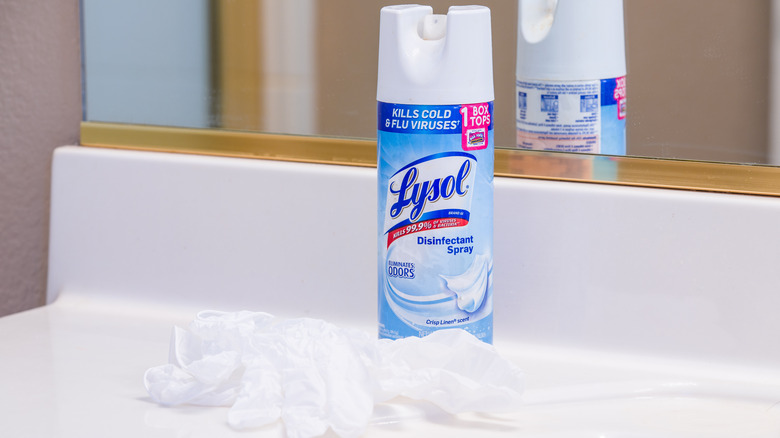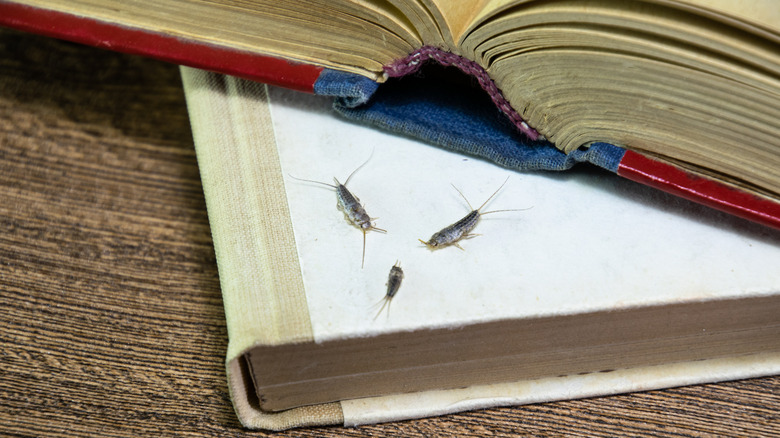The tiniest critters can give a huge fright when spotted scampering across your home. Silverfish, a species of small, multi-legged insects with pronounced antennae, are a common household pest with an affinity for damp, dark spaces. It’s common to discover these bugs in basements, sinks and tubs, or behind baseboards and door frames. While these creepy crawlers don’t bite or pose any significant harm to people or pets, it’s important to curb the presence of silverfish in your home before an infestation occurs. There are a number of common household products that can be used to get rid of silverfish in a pinch, including Lysol disinfectant spray.
Silverfish are chewing insects that have the potential to damage home fixtures and contaminate food. Their excrement may also leave brown stains on surfaces, and they can make allergies worse. These reasons may cause you to want to banish them from your home. While Lysol by itself may not completely remove silverfish, using it in tandem with prevention tactics can make a significant difference, especially if you need an immediate solution.
Why can Lysol kill silverfish?

Lysol’s active ingredients are designed to eliminate bacteria and germs. Benzalkonium chloride, a prominent component of Lysol, has also been labeled by the Pesticide Properties Database as an unclassified pesticide. Anecdotal evidence has backed up benzalkonium chloride’s insect extermination capabilities, specifically with silverfish. Further anecdotal evidence states that alcohol — another ingredient found in Lysol — can quickly kill silverfish as well. For instance, Mighty Men Pest Control suggests spraying their nest with ethyl alcohol.
Some insects, including silverfish, breathe through a cluster of holes on their backs. These breathing holes become clogged when Lysol is sprayed on them, leading to suffocation. Benzalkonium chloride helps the toxins in Lysol stick to the bodies of insects, ensuring that the poison can do its job efficiently. This allows for a swift death that leaves the insect in one piece, so carcasses can be easily disposed of. Silverfish have no natural protection against Lysol spray, so they won’t become resistant to this extermination method over time. The strong, astringent scent of household cleaners may also serve as a deterrent for other silverfish that occupy the same space. While there is no concrete scientific evidence proving the lethality of Lysol on silverfish, it may be worth a try if you have a bottle on hand.
Using Lysol to kill silverfish

Lysol should be used in tandem with other methods to ensure complete removal. Before you begin killing silverfish around your home, eliminate potential breeding areas and food sources that may be attracting them. Store dry goods in airtight containers, use a dehumidifier in damp spaces, and keep stacks of paper, magazines, and newspapers to a minimum. You’ll also want to avoid a crucial mulch mistake regarding debris surrounding the home, which can be tracked inside and bring bugs with it.
Be sure to focus the use of Lysol around the areas you see the most silverfish in your home to kill as many insects as you can at once. One good spritz is typically strong enough to stop a bug in its tracks. It is also imperative to only use Lysol in well-ventilated areas, as the toxic chemicals in the spray can potentially cause breathing difficulties or eye irritation.
Keep in mind that Lysol is unlikely to kill clusters of silverfish eggs, which are typically laid in small crevices that the spray can’t reach. Egg clusters indicate that your silverfish infestation is far from solved, so be vigilant with pest control as new hatchlings are born. Do periodic inspections for baby silverfish around the home, then use Lysol as an extermination method once they venture into accessible areas. It’s also important to note that these methods may not work for everyone, and those who don’t see positive results should contact a pest control professional.



